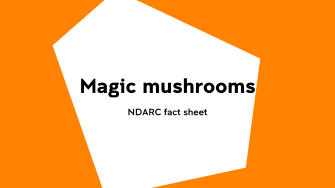2 Jun 2025
NDARC fact sheet:
Magic mushrooms
Magic mushrooms

Magic mushrooms typically look like ordinary mushrooms and are naturally occurring. They are a type of psychedelic drug, with the active ingredient being psilocybin. When consumed, psilocybin is converted in the body to psilocin, which is the chemical with the psychoactive properties.
Magic mushrooms are consumed for their hallucinogenic effects. The effects of magic mushrooms usually begin within 30 minutes when eaten, or between five to 10 minutes when taken as a soup or tea. Effects can last approximately four to six hours.
Magic mushrooms can affect everyone differently, based on their health, whether the person is used to taking it, whether other drugs are taken around the same time, the amount taken, the strength of the mushroom (varies depending on the type of mushroom) and where the drug is taken.
During this time, the person may experience:
On 1 July, 2023, the Therapeutic Goods Administration amended its scheduling of psychedelic substances to allow the prescription of psilocybin for use in psychedelic assisted psychotherapy for treatment-resistant depression. Trials as to their effectiveness and safety in treating various psychiatric conditions are ongoing.
Magic mushrooms look similar to poisonous mushrooms that can cause a person to become very sick and can result in death.
Bad trips
Magic mushrooms and other hallucinogens have the potential to give rise to psychotic symptoms which may be distressing when experienced as a “bad trip”. Features include:
Psychotic symptoms lasting longer than 24 hours are rare but have been reported.
Hallucinogen persisting perception disorder
Regular use of magic mushrooms may cause hallucinogen persisting perception disorder, in which a person can experience flashbacks weeks, months or even years after the drug was last taken. They are usually visual distortions that involve changes in emotions or perception.
These flashbacks can be disturbing, especially if a frightening experience or hallucination is recalled, and usually last a minute or two. Individuals with a history or family history of psychological issues appear to have a greater vulnerability of developing hallucinogen persisting perception disorder.
The effects of taking magic mushrooms with other drugs − including over the counter or prescription medications − can be unpredictable anddangerous.
For instance, magic mushrooms taken with methamphetamine or ecstasy can increase the chances of a bad trip and lead to panic, and mixing magic mushrooms with some psychiatric medications can lead to relapse or worsening of mental health conditions.
Unlike opioids, magic mushrooms tend not to produce long-term chronicity due to their infrequent use. Despite this, there is a recognised hallucinogen dependence syndrome.
Although deaths related to magic mushroom use are rare, they have been documented in Australia and overseas. Most of these deaths are due to traumatic injury, such as falls and motor vehicle accidents. Taking magic mushrooms can result in extremely distorted perception, unstable or depressed mood, or intense fear, which can lead to suicidal behaviour or misadventure.
Magic mushrooms were the most commonly used hallucinogen in 2022–2023, according to the Australian Institute of Health and Welfare, with 1.8% of people in Australia having used them in the last 12 months. This is double the proportion who had done so in 2019 (0.9%).
The Illicit Drug Reporting System (IDRS) is an Australian monitoring system run by the National Drug and Alcohol Research Centre (NDARC) at UNSW Sydney that identifies emerging trends of local and national concern in illicit drug markets.
The Ecstasy and Related Drugs Reporting System (EDRS) is an Australian monitoring system run by NDARC that identifies emerging trends of local and national interest in ecstasy and related drug use, markets and harms.
The Pocket Guide to Drugs and Health is a publication authored by experts from NDARC that provides information for health professionals on the impact of drug use.
The Australian Institute of Health and Welfare collects information on alcohol and tobacco consumption, and illicit drug use among the general population in Australia.
The Australian Bureau of Statistics is Australia’s national statistical agency, providing official statistics on a range of economic, social, population and environmental matters of importance to Australia.
Alcohol and Drug Foundation (2024). Psilocybin (magic mushrooms). Retrieved from: adf.org.au/drug-facts/psilocybin/
Australian Institute of Health and Welfare (2024). Hallucinogens in the NDSHS, Retrieved from: aihw.gov.au/reports/illicit-use-of-drugs/hallucinogens-ndshs
Darke, S., Lappin, J., & Farrell, M. (2024). The Clinician’s Guide to Illicit Drugs and Health (Revised Edition); London: Silverback Publishing.
Darke S, Duflou J, Peacock A, et al (2024). A retrospective study of the characteristics and toxicology of cases of lysergic acid diethylamide (LSD)- and psilocybin-related death in Australia. Addiction. doi.org/10.1111/add.16518
Department of Health and Aged Care (2023). Update on MDMA and psilocybin access and safeguards from 1 July 2023. Australian Government. Retrieved from: tga.gov.au/news/news/update-mdma-and-psilocybin-access-and-safeguards-1-july-2023
If you, or someone around you, is experiencing undesired or distressing psychological or physical symptoms from the intake of alcohol or other drugs, please seek immediate medical attention.
If you need urgent help from ambulance services, call Triple Zero (000). If a person has been mixing drugs with alcohol or other drugs, tell the paramedic exactly what has been taken.
For free and confidential advice about alcohol and other drugs, call the National Alcohol and Other Drug Hotline on 1800 250 015. The hotline will automatically direct you to the Alcohol and Drug Information Service in your state or territory.
2 Jun 2025
Fact Sheets
NDARC
Download this resource